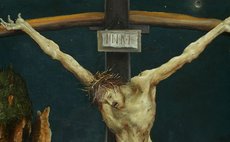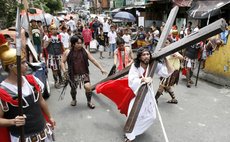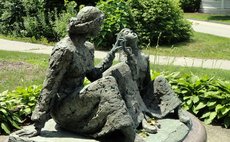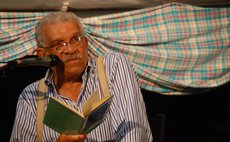Foot Soljah …
To my mind, Father Clement S. Jolly successfully articulated his understanding of Catholic Social Teaching (CST) in his article of February 22, 2013 in The Chronicle, entitled "In praise of righteous anger". This was a brilliantly crafted piece, accessible even to the least of us, which underscored my image of him as what the Jamaican Reggae artist Luciano refers to as Foot Soljah in his song of similar lyrics. Luciano sings,
Look at me now, as I travel along, in my heart I'm singing a song, yes I once was weak, but now I'm strong, I fully recognize the Father's plan To be in this world and not of this world, that's the way mankind should live - oh yea and everything we do or say we should think positive, and even the burdens will lighten our soul - yea and that's the way I will live my life, the little I have, the more I give - oh yeah to free myself of material wear, depending on naturality yeah
Fr. Jolly has been teaching us – everyone of us, Catholics and other denominations - about "this thing called life" and telling us about "Jah's love." And as with everyone who attempts to educate, enlighten and bring some sort of sense to the confusion, he has come under harsh criticisms from his "neighbours" whose lives he "disturbs". Mercifully and thankfully, like a foot soldier (foot soljah) he keeps, "trodding through Jah land, trying to ovastand [sic] this thing called life".
I imagine that Fr. Jolly, in light of his age and his very long contribution to the Church and his people, not to mention his social education of Dominicans, could sit back and feel satisfied that he has done what a human being of his calling could reasonably expect to do in a lifetime. This of course would be out of character for him. Indeed, he warns us against complacency which, he urges, is destructive to personal development and character building. We must "exhort people to be angry" for the right reasons, he says. He is distressed by the fact that many people are angry for selfish and self-serving reasons. Hence, many get angry with Fr. Jolly because his social teaching directly assaults their macro- and micro-transgressions. They get angry with him because he reminds them that the Church and more importantly God does not condone theft, money laundering, corruption, debauchery, drug trafficking, bad governance, electoral fraud, taking advantage of the ignorant, and so on. I have a strong sensibility that even some of Fr. Jolly's fellow priests and ordained ministers of religion might feel some discomfiture (to put it mildly and respectfully) with his straightforward and undistorted writings which do not mask or in any way conceal his belief that he is a soldier first and foremost of God, not of the earthly hierarchical Church! He does not refrain from "championing the good that is needed to build our country". He has detached himself in toto from the "moral paralysis" that is "evident in our society".
This is not surprising. For instance, on the matter of Natural Law and Conscience, CST appeals to "that sense of there being an objective right and wrong which is found the world over, deep in the conscience of all human beings." While CST concedes that we may from time to time diverge on the matter of whether certain actions are morally good or evil, it reminds us that we cannot escape the fact that there is moral good and evil and even more importantly, this good and evil is apparent to all. CST continues:
All of us, even the most liberal-minded, can be pushed to the point where we admit that certain actions (torturing children, for example) are morally unacceptable.… And in fact different races and cultures do not disagree as radically as we might think, even over the details of what counts as right and wrong (Stratford Caldecott, 2001).
CST teaches us something very profound next. It tells us that once we are sure within ourselves that we have done our best in arriving at our decision about what is right, then our duty is to proceed with the right action. Granted, we may not be right at all; however, deep within our consciences, we are doing what is right based on the information and circumstances before us. Further, we must take responsibility for our actions which, I dare say, is not a difficult proposition if we are confident in the "appropriateness" or "rightness" of our decisions and actions. However, CST urges,
… we must always remain open to the possibility of revising our judgment if new evidence or a new argument comes to light. To act otherwise would be to betray our own selves, and thus to betray the image of God within us. (Stratford Caldecott, 2001)
Hence, a gentleman with Fr. Jolly's calling or vocation has to be especially sure that he is doing what is right in his mind and based on his understanding of what The Good Shepherd expects of him. To be sure, it is bad enough to lie to others but to lie to one's own self is a squalid betrayal. Indeed one has to be absolutely depraved to consistently treat himself or herself to a dose of lies. Logically, if one cannot tell himself or herself the truth, it would be virtually impossible to tell others the truth. Fr. Jolly knows that and so it is quite possible to argue that his stance on social and political issues allows him to sleep very peacefully at nights while others, even those who have similar callings like himself, toss and turn because they have betrayed the image of God within themselves.
Let us be absolutely clear on this: People generally know when they have acted inappropriately or wrongly. Do not be fooled by their histrionics, defences and even attacks. When the dust has settled at the end of the day, and they retire to bed at night, they silently concede that whoever pointed out their wrongful ways have done so justifiably. They may want to silence their critics because they are tormented by their depraved actions. If they are not, then you can consider them irredeemable and incurable.
Fr. Jolly understands his purpose, that is, according to CST, he has been:
… commissioned by God himself, who sent [him] into the world, to do something. This gives [him] the right to whatever [he needs] to accomplish that task without compromising the mission of others, and it lays on others the corresponding duty to help [him]. (Stratford Caldecott, 2001)
He has understood over the many years of his Christian and Religious Ministry that:
… we especially need to respect and protect those who lack the power or the visibility to defend these rights for themselves – the poor, the unborn, the sick, the uneducated, the homeless. As always, the Christian vision should turn everything around: worry first about the justice for others, and one's own rights will take care of themselves. (Stratford Caldecott, 2001)
And about Freedom, CST admonishes:
… it doesn't matter so much how many choices we have – how much 'power to choose' – the question is whether we possess the interior strength to do the right thing. (Stratford Caldecott, 2001)
From observing this religious man's commentary over the years, it is quite possible to argue that he will NOT be contained by any earthly man or woman in his pursuit of finding the truth, doing what is right and in educating a nation into doing the same. With his fine example, one expects and hopes that one day, most of his ordained brethren will gather the courage to do likewise, assuming they truly understand what God expects of them and His promise to be at their side or even to carry them when times are challenging. Well done, Fr. Jolly!
(c) Dr. Francis O. Severin is the Acting Director of the University of the West Indies Open Campus Country Sites.




